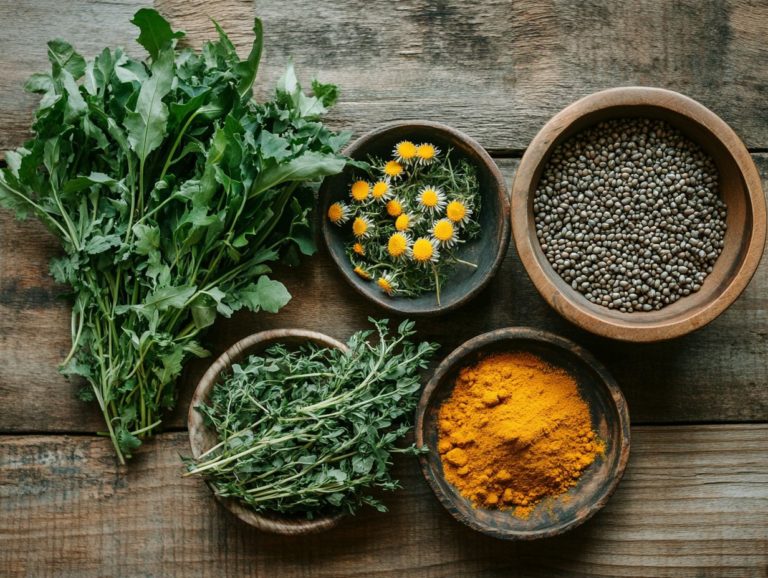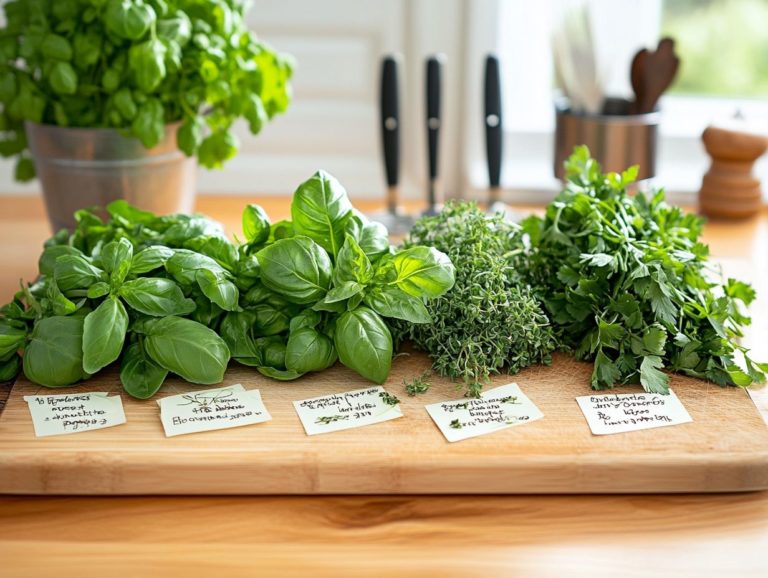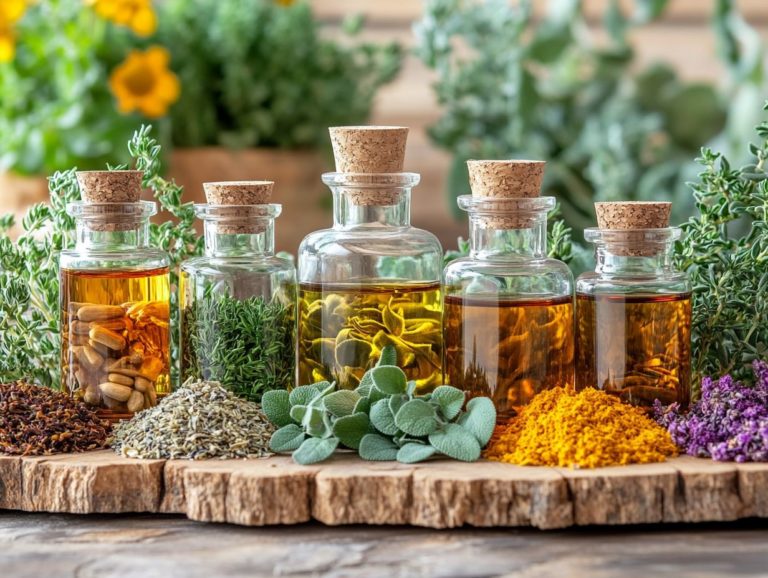Understanding Herbal Medicine: A Beginner’s Guide
Get ready to unlock the secrets of herbal medicine and transform your health naturally!
Herbal medicine has served as a cornerstone of healthcare for centuries, harnessing the power of plants to promote healing and well-being.
In this exploration, you will delve into the rich history and various types of herbal medicine. Gain insight into the distinctions between traditional and modern practices. Discover the benefits and common applications, alongside potential risks and safety considerations.
Equipped with practical tips for using herbal remedies and guidance on selecting the right one, this guide is tailored for anyone eager to integrate herbal medicine into their wellness routine.
Contents
- Key Takeaways:
- What is Herbal Medicine?
- Types of Herbal Medicine
- Benefits of Herbal Medicine
- Potential Risks and Side Effects
- How to Use Herbal Medicine
- Finding the Right Herbal Medicine for You
- Common Questions About Herbal Medicine
- What is herbal medicine?
- What are the benefits of using herbal medicine?
- Are there any risks or side effects associated with herbal medicine?
- How is herbal medicine different from pharmaceutical drugs?
- Are there any precautions to take when using herbal medicine?
- How can I incorporate herbal medicine into my daily routine?
Key Takeaways:
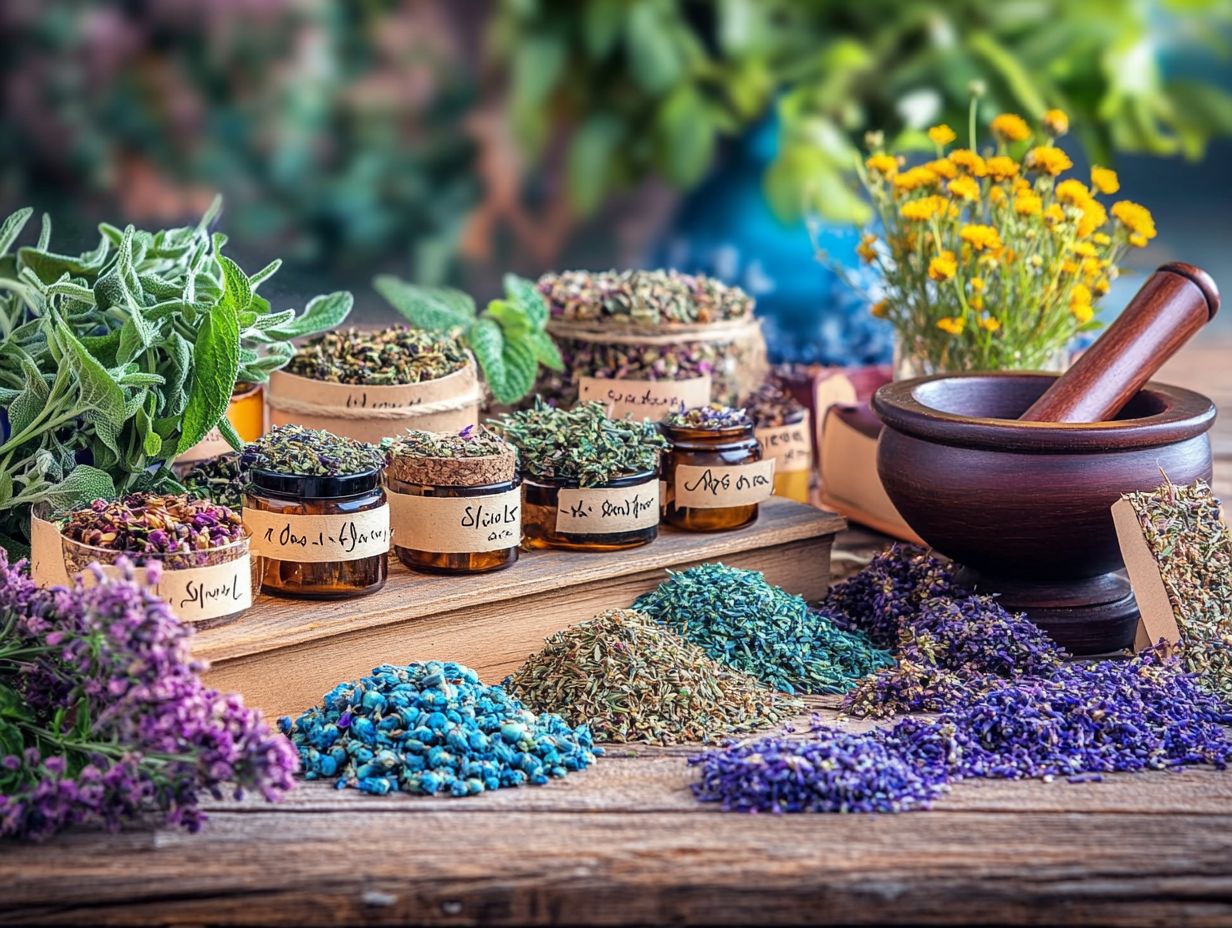
Herbal medicine is a natural form of treatment that has been used for centuries, combining traditional and modern techniques for maximum effectiveness. There are various types of herbal medicine, each with its own unique benefits and potential risks.
It is important to consider safety precautions and consult a healthcare professional before use. When using herbal medicine, you must understand the proper methods and dosage guidelines, along with individual factors such as allergies and medication interactions.
What is Herbal Medicine?
Herbal medicine, commonly known as herbalism, involves using different healing herbs and plant-based remedies to enhance health and address various ailments. This ancient healing tradition boasts rich origins in cultures across the globe, with roots extending back thousands of years.
In recent times, figures like Rosemary Gladstar have breathed new life into this practice, making it more relevant than ever. Herbal medicine taps into a vast array of plants, each offering distinct properties and therapeutic benefits.
As you explore the shift towards natural wellness solutions, grasping the principles and practices of herbalism becomes essential for navigating today s landscape of herbal remedies.
Definition and History
The definition of herbal medicine involves using different healing herbs and plant extracts to promote health and treat illnesses. This practice has significantly evolved over centuries.
You can trace this evolution back to ancient civilizations, like the Egyptians, who harnessed the therapeutic properties of garlic and myrrh. Meanwhile, the Chinese were busy developing traditional practices that showcased herbal formulas such as ginseng and ginger.
The Greeks made their mark by documenting their knowledge through influential figures like Hippocrates. He emphasized the healing potential of herbs such as peppermint and chamomile.
In cultures around the globe ranging from the Amazon’s rich biodiversity to the time-honored Ayurvedic traditions of India herbal remedies have been meticulously crafted over time. This reflects a profound understanding of nature’s pharmacy and its remarkable impact on human health.
Types of Herbal Medicine
Herbal medicine can be elegantly divided into two distinct categories: traditional approaches, deeply rooted in ancient practices and cultural heritage, and modern approaches that seamlessly blend scientific research with innovative herbal remedies.
Traditional vs. Modern Approaches
Traditional herbal medicine draws heavily from centuries-old practices passed down through generations. Modern herbal remedies often incorporate scientific research to validate the efficacy and safety of these natural treatments.
Traditional practices offer timeless wisdom that has stood the test of time. Modern systems place a premium on empirical evidence and reproducibility. For example, both traditions have long utilized herbs like chamomile and peppermint for digestive issues, yet contemporary studies are now examining their specific active compounds and mechanisms of action.
The synergy between ancient wisdom and modern science gives you the power to make more informed choices, allowing you to embrace traditional remedies alongside clinically validated options.
As ongoing research reveals the bioactive potentials of these plants, this fusion of methodologies is paving the way for a richer and more holistic understanding of wellness.
Benefits of Herbal Medicine
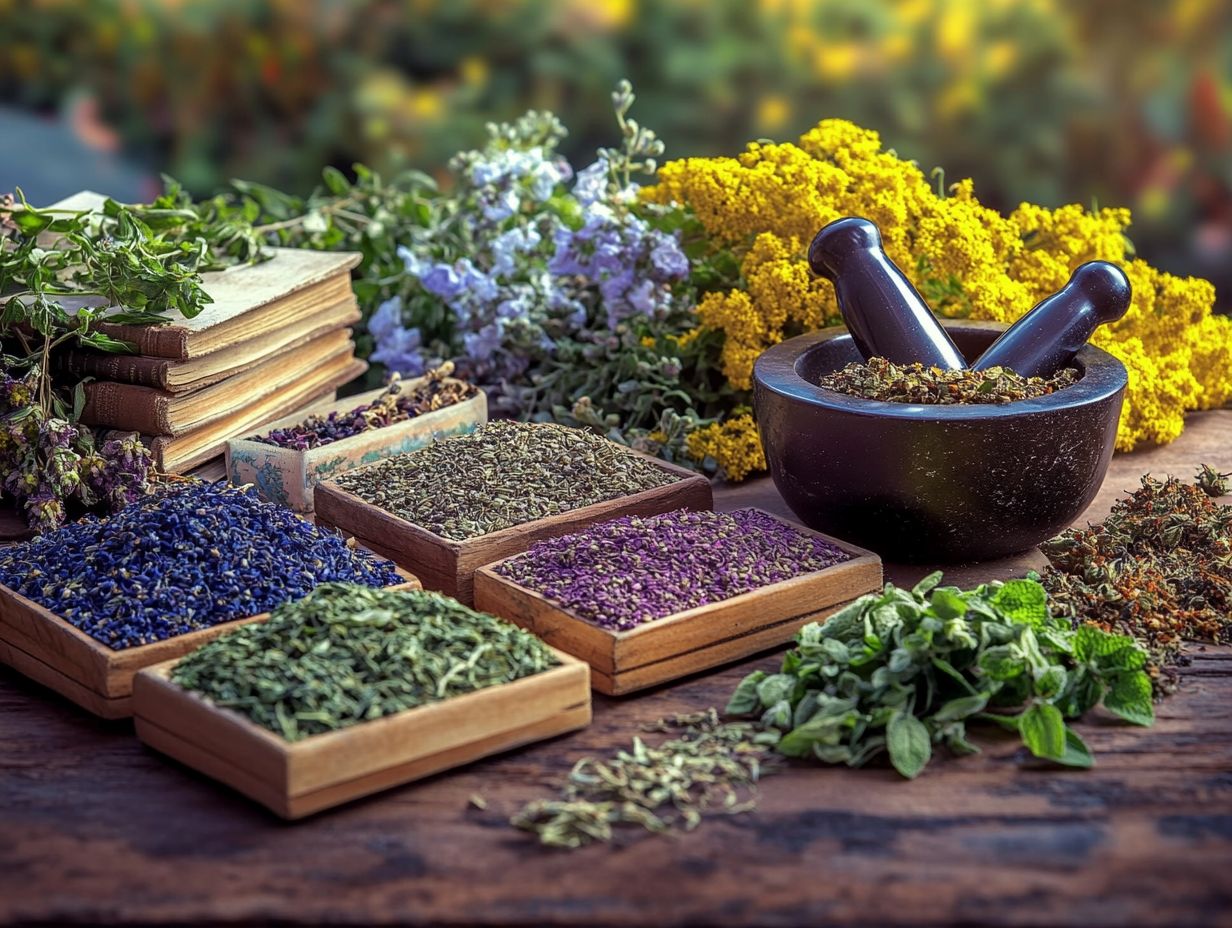
The benefits of herbal medicine are truly multifaceted. These remedies not only offer relief from common ailments but also promote your overall wellness.
They can enhance your immune system and provide natural solutions for relaxation and anxiety, allowing you to embrace a more balanced and harmonious lifestyle.
Don’t miss out on the chance to enhance your wellness! Share your experiences with herbal remedies!
Common Uses and Effectiveness
Common applications of herbal medicine include using Echinacea to combat colds, Chamomile to encourage relaxation, and Feverfew to ease migraines. These natural remedies showcase their effectiveness.
Beyond these familiar uses, many other herbs have piqued the interest of holistic practitioners and researchers alike.
Peppermint is often used for digestive concerns, providing a natural solution for bloating and nausea. Ginger has earned acclaim for its anti-inflammatory benefits, making it a favored option for those with arthritis.
Numerous studies show that integrating these herbs into your wellness routine can lead to notable enhancements in overall health. Consumer feedback on herbal supplements reflects a growing appreciation for natural alternatives to conventional medicine, especially for managing chronic conditions.
Potential Risks and Side Effects
While herbal medicine presents a wealth of benefits, it s crucial to acknowledge the potential risks and side effects that may accompany its use.
Since not all herbal products are regulated by the FDA, valid safety concerns and possible health implications must be considered.
Safety Considerations
When it comes to herbal medicine, prioritizing safety is paramount. You should understand the possible side effects and the importance of consulting healthcare professionals before starting any herbal supplement.
Did you know that herbal remedies can interact with prescription medications? This might lead to unintended health issues. If you re considering herbal options, be mindful of specific interactions, especially if you have pre-existing conditions like liver disease or if you re pregnant.
Engaging in open conversations with your healthcare providers can offer invaluable insights. This ensures that the herbal treatments you choose align safely with your overall health plans. By taking these precautions, you promote safe usage and enhance the effectiveness of herbal medicine in supporting your well-being.
How to Use Herbal Medicine
To use herbal medicine effectively, grasp various preparation methods, determine appropriate dosages, and identify the best ways to integrate herbal remedies into your daily health routines.
Methods and Dosage Guidelines
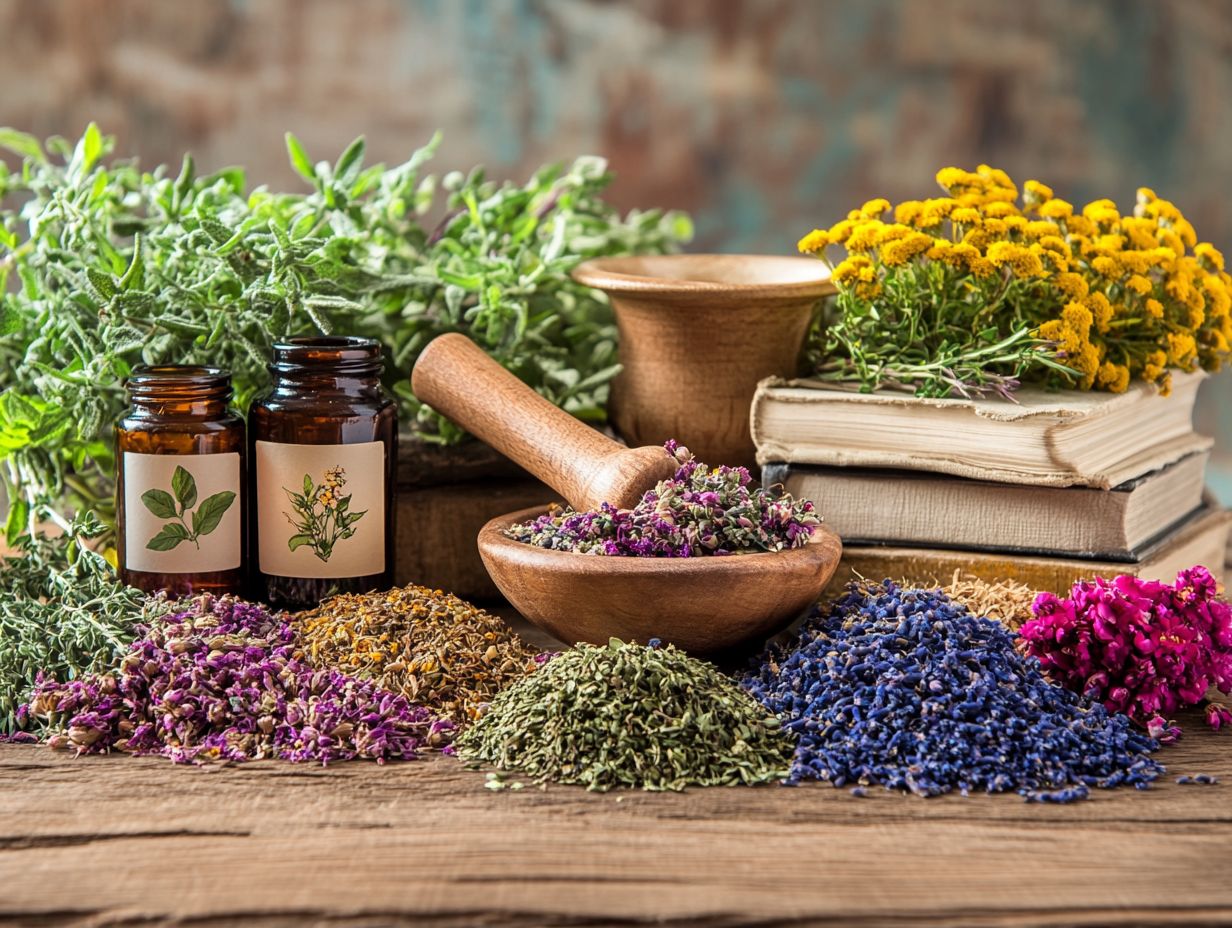
Methods and dosage guidelines for herbal remedies can vary widely based on the type of herb, its intended use, and the preparation method. Therefore, it s vital to adhere to established recommendations for safety and effectiveness.
Experienced practitioners often suggest herbal teas for milder effects. Simply steep dried leaves in hot water for about 10-15 minutes to extract beneficial compounds. For a more concentrated dose, consider using infusions. These require a longer steeping time of several hours or even overnight, especially with herbs like nettle and chamomile.
Extracts are concentrated forms of herbs that use alcohol or glycerin to pull out the active ingredients. It s essential to recognize that different herbs have specific recommended dosages.
For instance, you might use:
- 1-2 teaspoons of dried peppermint leaves per cup for tea,
- and tinctures could recommend 30-40 drops, depending on the herb’s potency and your intended effects.
Finding the Right Herbal Medicine for You
Finding the ideal herbal medicine tailored to your specific needs requires thoughtful consideration of your individual health goals, conditions, and preferences.
By ensuring that the chosen herbal remedies resonate with your wellness objectives, you pave the way for a more harmonious and effective health journey.
Explore the world of herbal medicine today to discover how it can transform your health! Always consult with a healthcare provider before starting any herbal regimen.
Factors to Consider When Choosing
When selecting herbal remedies, consider several factors, including your health goals, potential interactions with medications, and personal preferences. This attention ensures the herbal medicine you choose is both effective and safe.
Your diet and exercise choices can significantly impact how your body metabolizes herbs. Gender and age are also crucial considerations; certain herbs may be more suitable for specific demographics. For example, women often seek different remedies during pregnancy or menopause than men do.
Reviewing your medical history is essential, as any pre-existing conditions may influence how herbal substances interact with your treatments. Given these complexities, it’s wise to consult with a healthcare professional before incorporating herbal remedies into your wellness routine.
Watch this video to learn more about the benefits of herbal remedies!
Common Questions About Herbal Medicine
What is herbal medicine?
Herbal medicine uses plants or plant extracts to treat various health conditions. It has been practiced for centuries and is still widely used today.
What are the benefits of using herbal medicine?
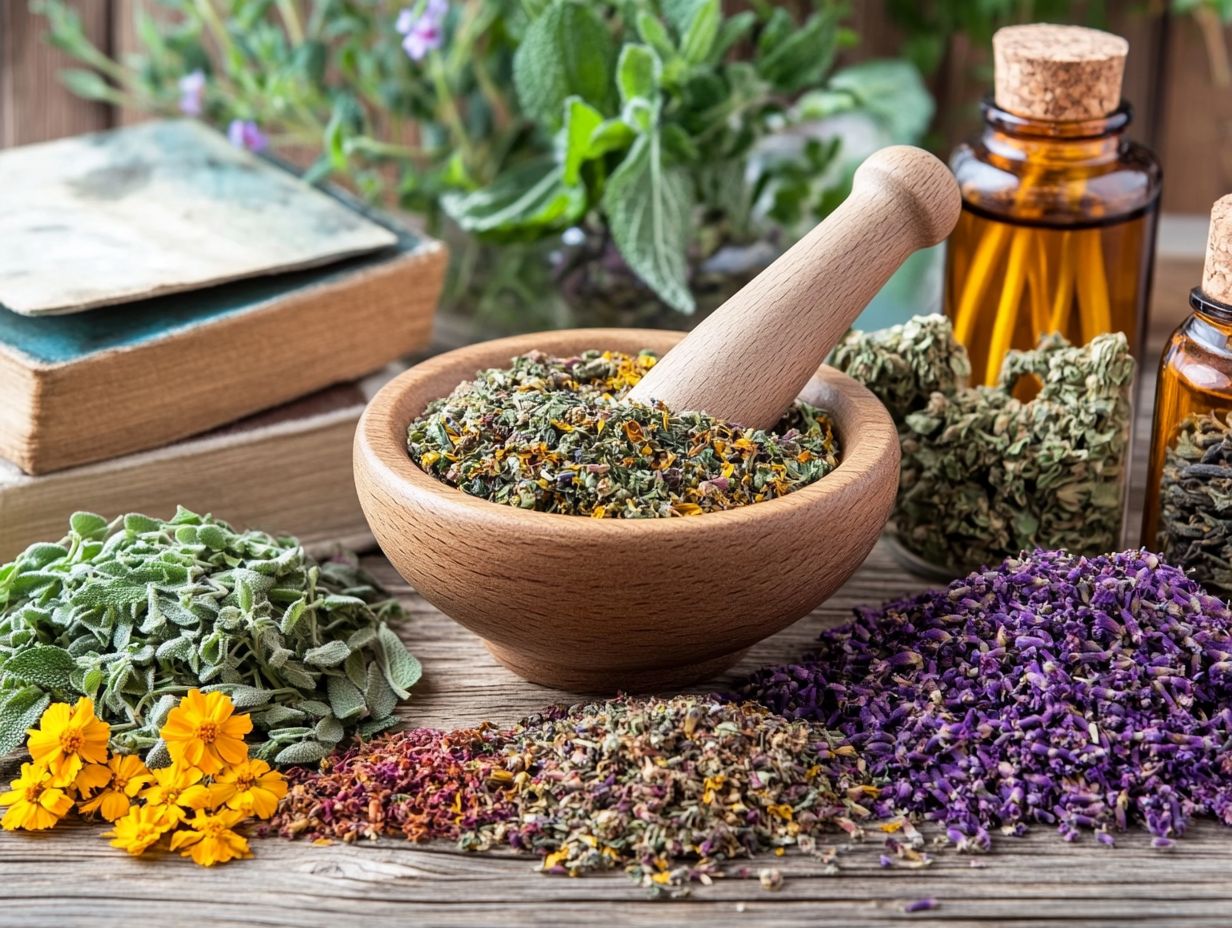
Using herbal medicine can provide relief from symptoms, boost the immune system, promote overall well-being, and often have fewer side effects compared to pharmaceutical drugs.
Are there any risks or side effects associated with herbal medicine?
While herbal medicine is generally safe, risks and side effects can occur depending on the specific herb and your health conditions or medications. Always consult with a healthcare professional before using herbal medicine.
How is herbal medicine different from pharmaceutical drugs?
Herbal medicine comes from natural plants, while pharmaceutical drugs are synthetically created in a lab. Herbal medicine tends to take a gentler, holistic approach to healing, treating the whole person rather than just the symptoms.
Are there any precautions to take when using herbal medicine?
Yes, make sure to research the specific herb and consult with a healthcare professional before using herbal medicine, especially if you have health conditions or are taking medications. Follow recommended dosages and stop using the herb if you experience any adverse reactions.
How can I incorporate herbal medicine into my daily routine?
There are many ways to include herbal medicine in your daily routine, such as drinking herbal teas, using herbal supplements, or adding herbs to your cooking. Always do proper research and consult with a professional before trying any new herbal remedies.
Ready to discover how herbal medicine can enhance your health? Start your journey today!




